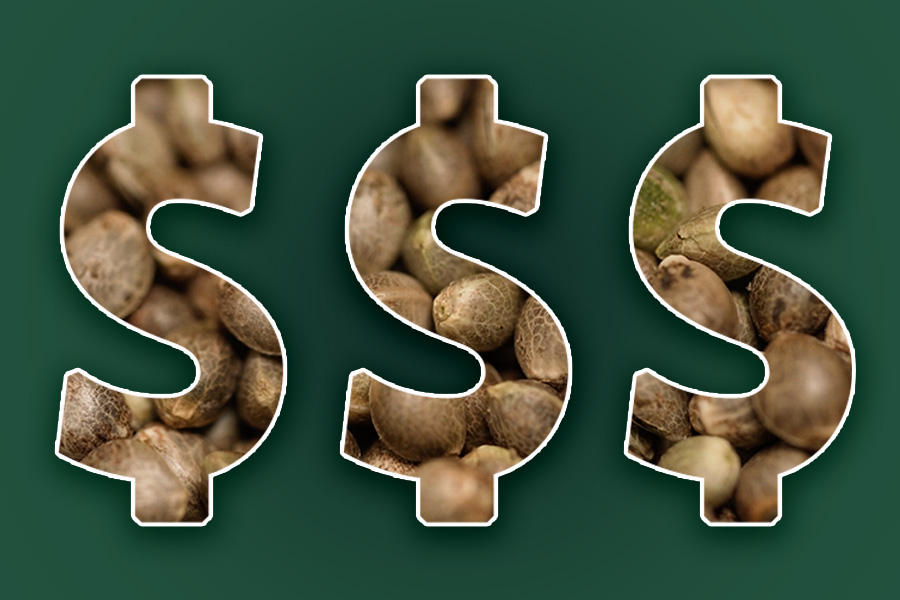Cost of Seed in the Legal Market
In light of cannabis legalization all over the country, there has been much discussion about both the wholesale and retail cost of cannabis seed. The price is going down, but how much do cannabis seeds cost, and how much is it going down? Where will the wholesale price stabilize? Where will the retail price stabilize? In the U.S. and Europe a small number of large companies, known as seed banks, have historically controlled the seed market by figuring out innovative solutions to payment processing and risk mitigation.
Proliferation of Seed Purveyors: More Quantity is not equal to more Quality
True breeders and newcomers face discouragement in entering the market due to the complexity and risk of a product that has been federally illegal. With the circulation of the DEA memo that de facto decriminalized seed sales, there has been a burst of newcomers into the marketplace. This has slowed sales substantially for many of the seedbanks, in many cases 30% or more. It has also put a spotlight on both quality and price considerations.
Difficulty of Sourcing Quality Seeds for Seedbanks
Seed Banks have taken a variable approach to sourcing seed. Some carry multiple brands or breeders while others source seed to white label and only sell seed via their own in-house brand. Regardless, seed banks have focused on driving down the wholesale or white-label seed price, while the retail price has remained relatively stable. Many of the seedbanks have narrowed their requirements for seed sourcing. They have been ruthless and cavalier in their focus on two things and only two things: They have to germinate well and they have to be cheap. And we know, by focusing on these two things and these two things only, they’re missing most of the story.
Sourcing Cheap Seed (Replication) vs. Providing Quality Seed (Precision Breeding and Production)
The best way to source cheap seed is to source seed that has been produced cheaply. What does this mean? This means that breeders have performed little to no work or breeding on the parents to ensure quality, consistency, or predictable results. This is simply seed replication. We must differentiate between the legacy breeding methods and modern agricultural breeding specifically for seed. To date, by and large simple crosses have been made with winning plants selected and cloned. Seed made from these crosses is very heterozygous and variable. In some cases of cheap seed production, seed plants are used to produce more seed, and clones are not even used. This is the cheapest way but also produces exponentially more variation and unpredictability. Understanding how much cannabis seeds cost in relation to quality versus cheap production is essential for growers.
High Quality Seed Production: Utilizing Clones and Producing for Uniformity vs Open Pollinated Production
When breeders use clones, the resulting seeds contain exactly 50% of one genome and 50% of another. When seeds are used it’s anybody’s guess. Breeding for consistent and uniform seed specifically takes time, often years, in some cases many years. This time costs money and takes expertise at each step in the process. Parental lines are inbreed, backcrossed, and inbred more until the desired traits have been isolated and undesirable traits excluded. These inbred lines (IBLs) are then crossed in various ways to produce the stable F1 hybrids of modern agricultural breeding. Once the IBL is in hand, it requires money for proper maintenance, in the form of keeping breeding stock in tissue culture or in good health in the breeders library. Finally, breeders also produce good, reliable seed using proprietary techniques that differ significantly from cheap and simplistic open-pollinated seed runs.
Traditional Costs of F1 Hybrids vs. Open Pollinated Vegetable Seed
The vegetable seed industry price comparison on open pollinated vs F1 hybrids is important to provide context: Cucumber seed, even in a mature market, is still incredibly expensive. F1 hybrids cost as much as $1.31 per seed and generally range in the $.20-.$.60 cents (per seed range) while marketmore cucumbers, a traditional and open pollinated favorite cost $.0055 cents per seed which means that hybrid cucumber seed costs about 55x more on average than open pollinated seed.
